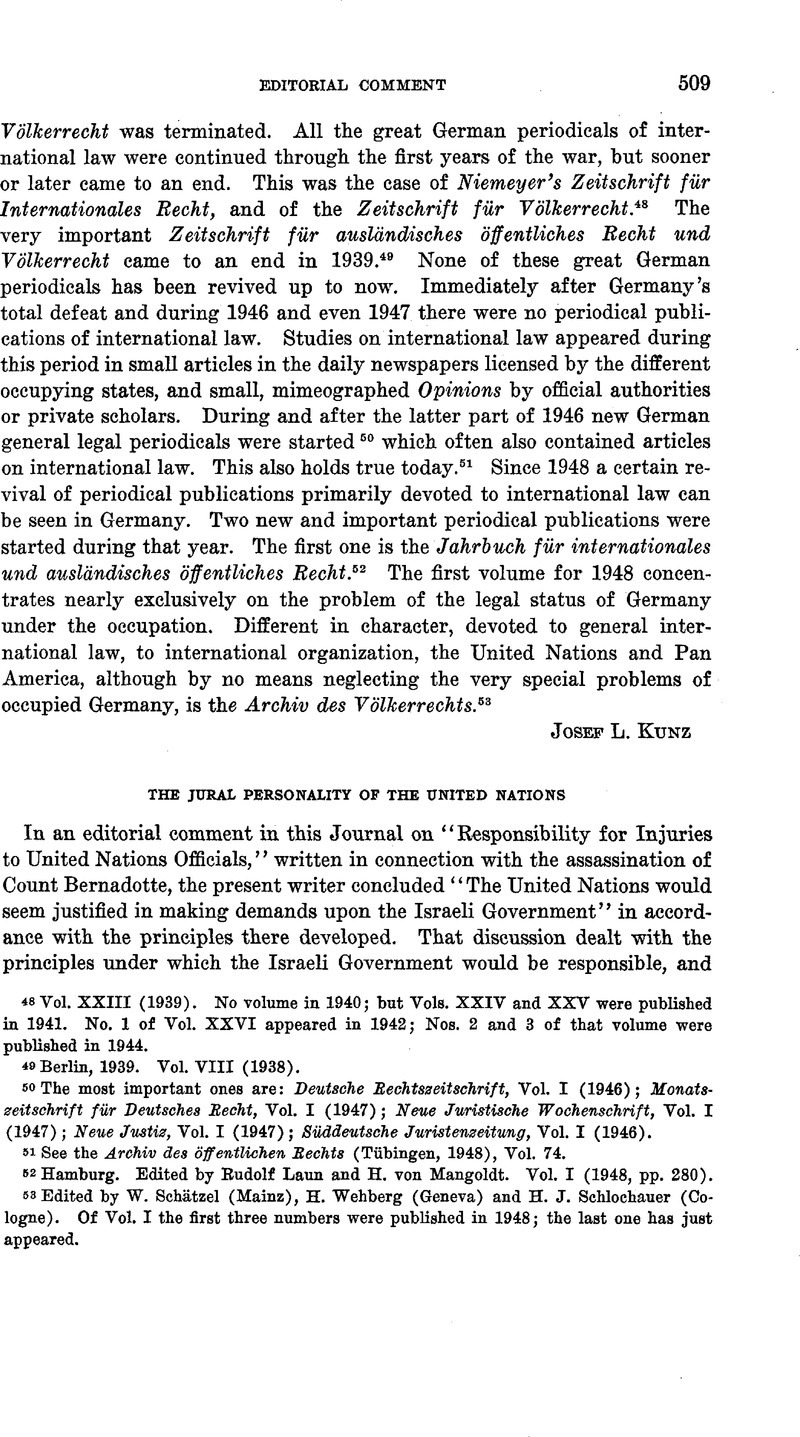Article contents
The Jural Personality of the United Nations
Published online by Cambridge University Press: 20 April 2017
Abstract

- Type
- Editorial Comment
- Information
- Copyright
- Copyright © American Society of International Law 1949
References
page 510 note 1 This Journal, Vol. 43 (Jan. 1949), p. 103. The two questions are not identical. International law might hold that a state has a special responsibility in case an agent of an international organization is injured in its territory, but that the claim must be made by the state of the agent’s nationality or by a state member of the organization, rather than by the organization itself. In the summary made by Judge Badawi Pasha (Egypt) of the arguments submitted in support of the United Nations claim under I (b), some of the arguments (especially 3 and 5) concerned directly the existence of responsibility and the measurement of reparation, and only indirectly the capacity of the United Nations. I.C.J. Reports, 1949, p. 209.
page 510 note 2 I.C.J. Reports, 1949, p. 174; this Journal, p. 589.
page 510 note 3 I.C.J. Reports, 1949, p. 175.
page 510 note 4 Ibid., p. 179.
page 511 note 5 Wright, Q., Mandates under the League of Nations (Chicago, 1930), pp. 364 Google Scholar ff.
page 511 note 6 Goodrich, L. W. and Hambro, E., Charter of the United Nations, Commentary and Documents (2nd ed., Boston, 1949), pp. 519ff.Google Scholar; Commission to Study the Organization of Peace, Fifth Report, Security and Disarmament under the United Nations (1947), pp. 13 ff.
page 511 note 7 I.C.J. Reports, 1949, p. 185.
page 511 note 8 Ibid., p. 177.
page 511 note 9 Ibid., p. 218.
page 511 note 10 Ibid., p. 195.
page 512 note 11 Ibid., p. 182.
page 512 note 12 Ibid., pp. 182-184.
page 513 note 13 Ibid., pp. 202-203.
page 513 note 14 Ibid., pp. 200, 210.
page 513 note 15 Ibid., p. 184. The Court seems to have considered that the legal interest of the United Nations which was clearly established by obligations in respect to its agents undertaken by states in specific agreements, was also implied in respect to such obligations arising from general international law.
page 514 note 16 Whiteman, Marjorie, Damages in International Law (Washington, 1937), Vol, 1, p. 80 Google Scholar.
page 514 note 17 I.C.J. Reports, 1949, p. 181.
page 514 note 18 Ibid., p. 183.
page 515 note 19 Ibid., p. 188.
page 515 note 20 Ibid., p. 186. Judge Badawi Pasha, dissenting, said Art. 2, par. 5 of the Charter created “a definitely political obligation” and could not, if that obligation were infringed, serve to found a right to make a claim for reparation due to the victim. Ibid., p. 211. Judge Krylov (Soviet Union), also dissenting, said Art. 2, par. 6, which extends the principles of the article to non-members, did so only “so far as may be necessary for the maintenance of international peace and security,” and this has “very little connexion with the right of the United Nations to bring an international claim with a view to obtaining reparation for damage.” Ibid., p. 218.
page 515 note 21 In a concurring opinion Judge Alvarez (Chile) held that the Court was utilizing its competence to “develop international law” in giving its opinion “in accordance with the general principles of the new international law, the legal conscience of the peoples and the exigencies of contemporary international life.” Ibid., p. 190. On the other hand Judge Krylov (Soviet Union), dissenting, said “we must found the right of the Organization ... on the express consent of States. . . . The Court can only interpret and develop the international law in force; it can only adjudicate in conformity with international law.” Ibid., p. 219.
page 515 note 22 McCulloch U. Maryland, 4 Wheat. 316; Gibbons U. Ogden, 9 Wheat. 1, 187.
page 516 note 23 Lauterpacht, H. (The Development of International Law by the Permanent Court of International Justice (London, 1934), p. 89)Google Scholar, after reviewing the actual results of the Court’s decisions and opinions, concludes: “The work of the Court can to a large extent be conceived in terms of a restrictive interpretation of the claims of State sovereignty, “and, reciprocally, a liberal interpretation of the competence of international bodies, although in words the Court usually made “courteous obeisance to the tradition of State sovereignty.” See Hudson, M. O., The Permanent Court of International Justice, 1920-1942 (New York, 1943), p. 660 Google Scholar.
- 1
- Cited by


